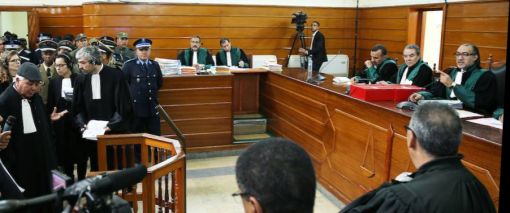
Former President-Rapporteur, United Nations Working Group on Arbitrary Detention, expresses deep concern after observing the court case against 24 human rights activists from the occupied parts of Western Sahara. 19 of the 24 Saharawis remain in jail.
A new report documents the Kafkaesque legal rocess against a group of political activists from Western Sahara, known as the Gdeim Izik Group. The men were on the 19th of July condemned to harsh sentences in the absence of material evidence. The report concludes that the 19 detainees are, and have for almost seven years, been imprisoned on arbitrary detention.
The UN Committee on Arbitrary detention visited the group in 2013, under the leadership of Mads Andenæs, law professor at the University of Oslo, and former head of the UN Committee on Arbitrary detention. Professor Mads Andenæs observed the Gdeim Izik trial on the 18th and the 19th of July, and has written the foreword to the report.

International observer Tone Sørfonn Moe and prof. Mads Andenæs, Casablanca, 18 July 2017. Professor Andenæs expresses deep concern after observing the court case against 24 human rights activists from the occupied parts of Western Sahara. 19 of the 24 Saharawis remain in jail to this date.
"The current report documents serious violations of international law on torture and fair trial", Mr. Andenæs states in foreword to the report.
“The breach of the international law on the right to a fair trial in the Universal Declaration of Human Rights and of Morocco's other international obligations renders the deprivation of liberty of the 19 detainees arbitrary. The 19 detainees were subjected to abductions or arrest involving torture or cruel, inhuman or degrading treatment or punishment. Their unlawful treatment has continued during their detention. The group has been detained for some seven years. Their conviction was not based on sufficient criminal material evidence,” Andenæs writes.
Download the report here.
The report is written by international observer Tone Sørfonn Moe who followed all steps of the legal process against the activists from December 2016 until today. It documents serious breaches of international norms:
- The group was subjected to political persecution due to their activism for self-determination for the Saharawi people.
- The breaches the right to a fair trial is of such gravity that the deprivation of liberty must be qualified as arbitrary.
- The 19 detainees were subjected to abductions or arrest not respecting their most basic human rights, involving torture or cruel, inhuman or degrading treatment or punishment. Morocco is in violation of multiple articles listed in the Torture Convention Torture.
- The group was condemned in the absence of criminal material evidence. The main evidence against the group is confessions extracted under torture, in direct violation of art. 15 of the Torture Convention.
The report recommends that the international community intervene to ensure justice for this group of political activists from Western Sahara.
In a new development last week, the Moroccan government seemingly tries to complicate the UN sub-committee on torture from visiting the group of political prisoners. The UN body is to visit Moroccan jails in October.
Early in the morning on the 16th of September; 18 of the 19 detainees of the Gdeim Izik Group were arbitrarily transferred from El Arjat prison to six different prison institutions throughout Morocco, without any prior notice.
“The Moroccan government seemingly tries to complicate the UN sub-committee on torture from visiting the group of political prisoners. The UN body is to visit Moroccan jails in October. It is urgent that the UN sub committee on torture visits the 19 detainees, and ensures that Morocco honors its international commitments”, Ms. Moe stated regarding the new development.
Demonstrations were held in cities of Western Sahara on the 21th of September, and demonstrators were attacked by the Moroccan police and army.
Order our Western Sahara poster!
“Try to Visit Western Sahara”…
The Security Council fails Western Sahara and international law
On 31 October 2025, a new resolution was adopted in the UN Security Council calling on the Saharawis to negotiate a solution that would entail their incorporation into the occupying power, Morocco.
Saharawis Demonstrate Against Trump Proposal
The United States has proposed in a meeting of the UN Security Council on Thursday that the occupied Western Sahara be incorporated into Morocco.
Skretting Turkey misled about sustainability
Dutch-Norwegian fish feed giant admits using conflict fishmeal from occupied Western Sahara. Last month, it removed a fake sustainability claim from its website.



